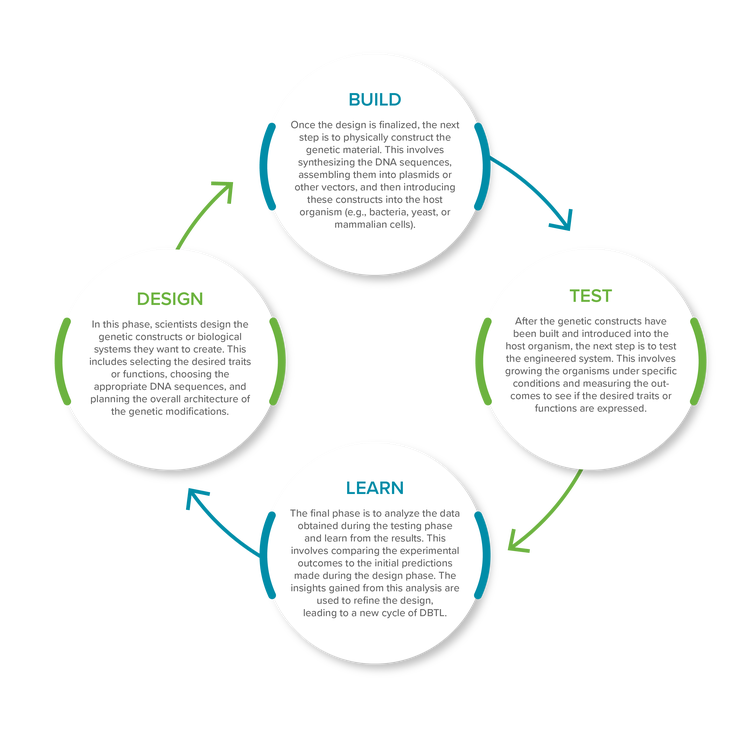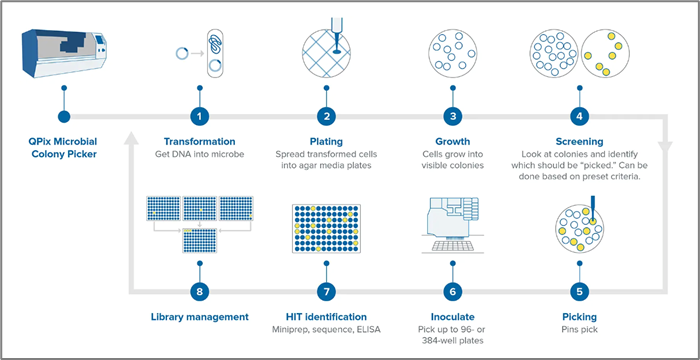What is synthetic biology?
Synthetic biology is a broad term referring to the manipulation of metabolic pathways to coax microbes to manufacture proteins in a highly predictable manner through the use of engineering principles, like the Design-Build-Test-Learn Approach (DBTL). Sometimes individual genes are modified and sometimes entire genomes are edited for desired characteristics.
Synthetic biology is an interdisciplinary field that combines principles from biology, engineering, and computer science to design and construct biological parts, devices, and systems with novel functions or capabilities. It has the potential to impact academic and industrial applications, including the creation of novel therapeutics and vaccines, plant science, and biofuels. The focus is often on generating, characterizing, and isolating parts of natural biological systems before using them as components of an engineered biological pathway.
Benefits of synthetic biology
The concept of a bio-based economy is central to the vision of a sustainable future powered by synthetic biology. This economy relies on renewable biological resources to produce food, materials, and energy, reducing dependence on fossil fuels and minimizing environmental impact. By transforming how we produce and consume resources, synthetic biology has the potential to create more sustainable and resilient economies.
Synthetic biology represents a transformative approach to solving some of the world's most pressing challenges. By leveraging the principles of genetic engineering and biology, this field offers innovative solutions that can drive progress in healthcare, food production, and environmental sustainability.
What is synthetic biology used for?
The essence of synthetic biology lies in its ability to engineer life at its most fundamental level, allowing us to reimagine and recreate biological systems with unprecedented precision and purpose. From the rapid development of vaccines that can halt pandemics to the creation of cultured meat that reduces the environmental toll of traditional agriculture, synthetic biology is revolutionizing how we approach problems and develop solutions.

For a deeper dive into the latest advancements and applications of CRISPR-Cas9 in disease research and treatment, read the blog and tune into the recent episode of the Drug Target Review podcast from Molecular Devices, featuring Dr. Pietro De Angeli from the Institute for Ophthalmic Research at the University Hospital Tübingen, and Dr. Maarten from the Princess Maxima Center.
Healthcare:
Synthetic biology is revolutionizing healthcare by enabling the development of new therapies and vaccines. For instance, engineered bacteria and viruses can be used to deliver therapeutic genes to patients, while synthetic biology techniques are being employed to produce complex biologic drugs more efficiently.
In addition to vaccines, synthetic biology is also being used to develop new therapies for genetic disorders. For example, CRISPR-Cas9 technology has shown promise in correcting genetic mutations that cause diseases such as sickle cell anemia and cystic fibrosis. By precisely editing the DNA of affected cells, researchers can potentially cure these diseases at their genetic root. This not only improves the quality of life for individuals affected by these conditions but also reduces the long-term healthcare costs associated with managing chronic diseases.
Environmental Management:
Synthetic biology can also contribute to environmental sustainability through the development of bio-based materials and the bioremediation of pollutants. Engineered microorganisms can be designed to break down environmental toxins or produce biodegradable plastics, offering greener alternatives to conventional industrial processes.
Synthetic Biology Automation

THE DESIGN-BUILD-TEST-LEARN (DBTL) APPROACH
One of the foundational concepts in synthetic biology is the idea of "biobricks," standardized DNA sequences that can be assembled in various combinations to build genetic constructs. Following the approach of the DBTL cycle (design-build-test-learn), synthetic biology allows for the systematic and predictable engineering of biological systems, similar to how electronic components are used to construct complex circuits

AUTOMATING YOUR SYNTHETIC BIOLOGY WORKFLOW
High-throughput synthetic biology applications benefit greatly from the increased productivity of a robot-controlled microbial colony picker such as our QPix Microbial Colony Picker, which picks up to 30,000 colonies per day with automatic pick run data tracking and database management. It can be integrated into an end-to-end molecular workflow, allowing users higher throughput and more walkaway time.
Synthetic Biology Applications and Resources
Synthetic biology enables the design and construction of bespoke biological systems with desired functionalities.


